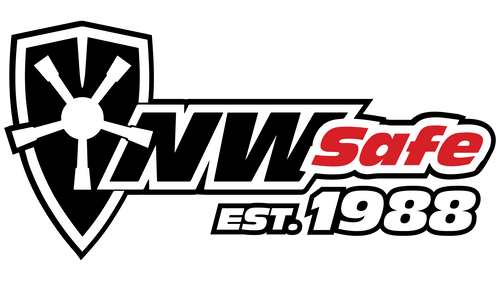Home safes are locking boxes in which you can store valuables and important documents to protect them from theft, fire, and damage. If you’re shopping for a home safe, you’ll find they come in a wide variety of sizes, styles, and levels of security. In this post, we’ll cover:
- What’s the Difference Between a Home Safe and a Gun Safe
- What to Look for When Shopping for a Home Safe
- Our Top Picks for a Home Safe
- Home Safe FAQs
What’s the Difference Between a Home Safe and a Gun Safe
In the eyes of the law, the only difference between a home safe and a gun safe is what you store inside (or intend to store inside). Simply put, any safe in which you store a firearm is technically a gun safe.
This distinction is important because, depending on the state in which you’re shopping, gun safes are tax-free and home safes are not. (In Washington State, gun safes are currently tax-free.)
In the eyes of a manufacturer, the primary difference between a home safe and a gun safe is how the interior is configured. Gun safes are explicitly configured to hold firearms. Home safes are designed to maximize storage for valuables such as cash, documents, jewelry, and precious metals.

What to Look for When Shopping for a Home Safe
While the aesthetic appeal of a home safe may well be top of mind, there’s more to consider the color and finishes when you want to keep your valuables safe.
1. Fire Rating
Some will tout the “fireproof home safe.” We’re here to tell you there is no such thing. No safe can withstand a flame indefinitely. That being said, home safe fire ratings range wildly from virtually no fire protection to up to 2.5 hours of fire protection.
We recommend you buy a safe with a fire protection equivalent to the value you’re trying to protect. Think of it like buying insurance — the higher the value, the more protection you want. This is especially true in recent years when wildfire season has become a serious concern for many.
2. Home Safe Security
Like the fire rating, we recommend buying a safe that matches the value of what you’re protecting. For example, we would never recommend filling an aluminum locking box with thousands of dollars in cash.
Generally speaking, the top home safes are made of 10-gauge steel and feature multiple military-style locking bars. They also feature highly dependable UL Listed locks.
3. Home Safe Size
This may sound obvious, but whatever safe you buy needs to actually fit in the space you have available. Before you start seriously shopping for a new home safe, be sure to identify where you want to install it and how big of a safe that space can accommodate.
How big should this space be? We always recommend buying the biggest, most secure safe your space and budget will allow. Unlike a house, safes can’t be remodeled. The only way to upgrade your safe is by replacing it.

Our Top Picks for a Home Safe: Liberty Premium Home Safes
The American-made line of Liberty Premium Home Safes features 120 minutes of fire protection and a Palusol heat-activated door that expands in high heat, creating a seal that protects against heat and smoke.
They are a UL listed safe. The doors feature three hardened steel plates to protect against drill attacks. Additionally, the slip-clutch mechanism protects against forced entry.
In short, if your home safe is intended to protect irreplaceable valuables, we would recommend investing in a premium home safe, like our top picks listed below:
Home Safe FAQs
Should You Buy a Portable Home Safe?
Generally speaking, portable home safes are smaller and lighter in weight. They are not mounted to the wall or floor. Rather, they are secured to a heavy-duty structure, like a bed frame or bedside table. These small portable home safes can be a great option for:
- Securing firearms and/or valuables on the go
- Securing small firearms and/or valuables you want to access quickly
That being said, we would not recommend using them to protect valuables from a burglary attack or house fire.
What Should Your Budget Be for a Home Safe?
Home safes can range in price greatly. How big your budget should be ultimately comes down to how much you can afford and what you’re trying to protect. One of the ways we help individuals shopping for a safe is with special financing. Depending on where you’re shopping, a payment plan could make the cost of a new safe more manageable.
Can You Get a Home Safe Professionally Installed?
Definitely. Our expert delivery and installation team is available to deliver and install your safe.
Should I Bolt My Safe to the Floor?
Bolting your safe to the floor is the most secure way to install it. This makes it more difficult for a thief to steal the physical safe or break into it on site.
Should I Hide My Safe at Home?
As a rule of thumb, we recommend installing your safe in a location that’s convenient for you to use. Making sure you use your safe to secure firearms and valuables is by far the most reliable way to keep them safe. That being said, what cannot be found, can’t be stolen. Hiding your home safe can add an extra layer of security. Get your top tips for how to hide a safe.
